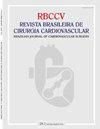Scientific Transparency: a New Horizon for Scientific Publication and the “New Cardiovascular Surgeon”
IF 1.2
4区 医学
Q4 CARDIAC & CARDIOVASCULAR SYSTEMS
Revista Brasileira De Cirurgia Cardiovascular
Pub Date : 2019-12-01
DOI:10.21470/1678-9741-2019-0608
引用次数: 1
Abstract
there are several publications in national and international journals that show the field’s rich tradition in the development of surgical techniques and medicines, among other products. However, in recent years, information technology has significantly impacted medical practice, and with this, several challenges have emerged, such as the provision and dissemination of health care information. With the constant growth of health research, falsification, plagiarism, and data fabrication have been having a deleterious effect on the results presented. Unethical conduct in research drains the foundations of science which, by their very nature, are built on previous evidences, and if these are false, these foundations are logically weakened. In this context, it is up to the hard work of the editors of major scientific publications to ensure to the researchers and the society the dissemination of papers with reliable and transparent results. Research misconduct means fabrication, falsification, or plagiarism in proposing, performing, or reviewing research, or in reporting research results[1]. It is important to point out that misconduct does not include honest mistakes or differences of opinion. Scientific integrity consists in sticking to strategies that allow the promotion and development of ethical and honest scientific standards that guarantee objectivity, clarity, reproducibility, openness, and accessibility, the caring duty, fairness in providing references and giving credit, and responsibility to future scientists and researchers. This is one of the main concerns that scientific editors face daily, and this topic has been included in the Brazilian Journal of Cardiovascular Surgery’s (BJCVS) new instructions. Plagiarism consists in the appropriation of someone else’s ideas, processes, results, or words, without giving the appropriate credits. The authors are responsible for the content and the information in their manuscripts. BJCVS uses the Similarity Check software, which allows to detect similarities in the submitted EDITORIAL科学透明:科学出版的新视野与“新型心血管外科医生”
在国家和国际期刊上有几篇出版物显示了该领域在外科技术和药物以及其他产品开发方面的丰富传统。然而,近年来,信息技术对医疗实践产生了重大影响,随之而来的是一些挑战,例如医疗保健信息的提供和传播。随着健康研究的不断发展,伪造、剽窃和数据捏造对所提供的结果产生了有害影响。研究中的不道德行为耗尽了科学的基础,而科学的基础从本质上讲是建立在以前的证据之上的,如果这些证据是错误的,那么这些基础在逻辑上就会被削弱。在这种情况下,主要科学出版物的编辑们要努力确保向研究人员和社会传播具有可靠和透明结果的论文。研究不端行为是指在提出、执行或审查研究或报告研究结果时捏造、篡改或抄袭[1]。需要指出的是,不当行为不包括诚实的错误或意见分歧。科学诚信包括坚持促进和发展道德和诚实的科学标准的战略,这些标准保证客观性、清晰性、可重复性、开放性和可访问性,关心他人的义务,提供参考和赞扬的公平性,以及对未来科学家和研究人员的责任。这是科学编辑每天面临的主要问题之一,这一主题已被纳入《巴西心血管外科杂志》(BJCVS)的新说明中。剽窃是指盗用他人的想法、过程、结果或文字,而没有给予适当的赞扬。作者对其手稿中的内容和信息负责。BJCVS使用相似性检查软件,该软件允许检测提交的EDITORIAL中的相似性
本文章由计算机程序翻译,如有差异,请以英文原文为准。
求助全文
约1分钟内获得全文
求助全文
来源期刊

Revista Brasileira De Cirurgia Cardiovascular
CARDIAC & CARDIOVASCULAR SYSTEMS-SURGERY
CiteScore
2.10
自引率
0.00%
发文量
176
审稿时长
20 weeks
期刊介绍:
Brazilian Journal of Cardiovascular Surgery (BJCVS) is the official journal of the Brazilian Society of Cardiovascular Surgery (SBCCV). BJCVS is a bimonthly, peer-reviewed scientific journal, with regular circulation since 1986.
BJCVS aims to record the scientific and innovation production in cardiovascular surgery and promote study, improvement and professional updating in the specialty. It has significant impact on cardiovascular surgery practice and related areas.
 求助内容:
求助内容: 应助结果提醒方式:
应助结果提醒方式:


